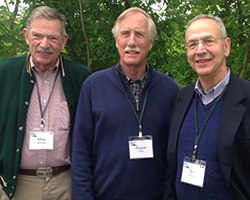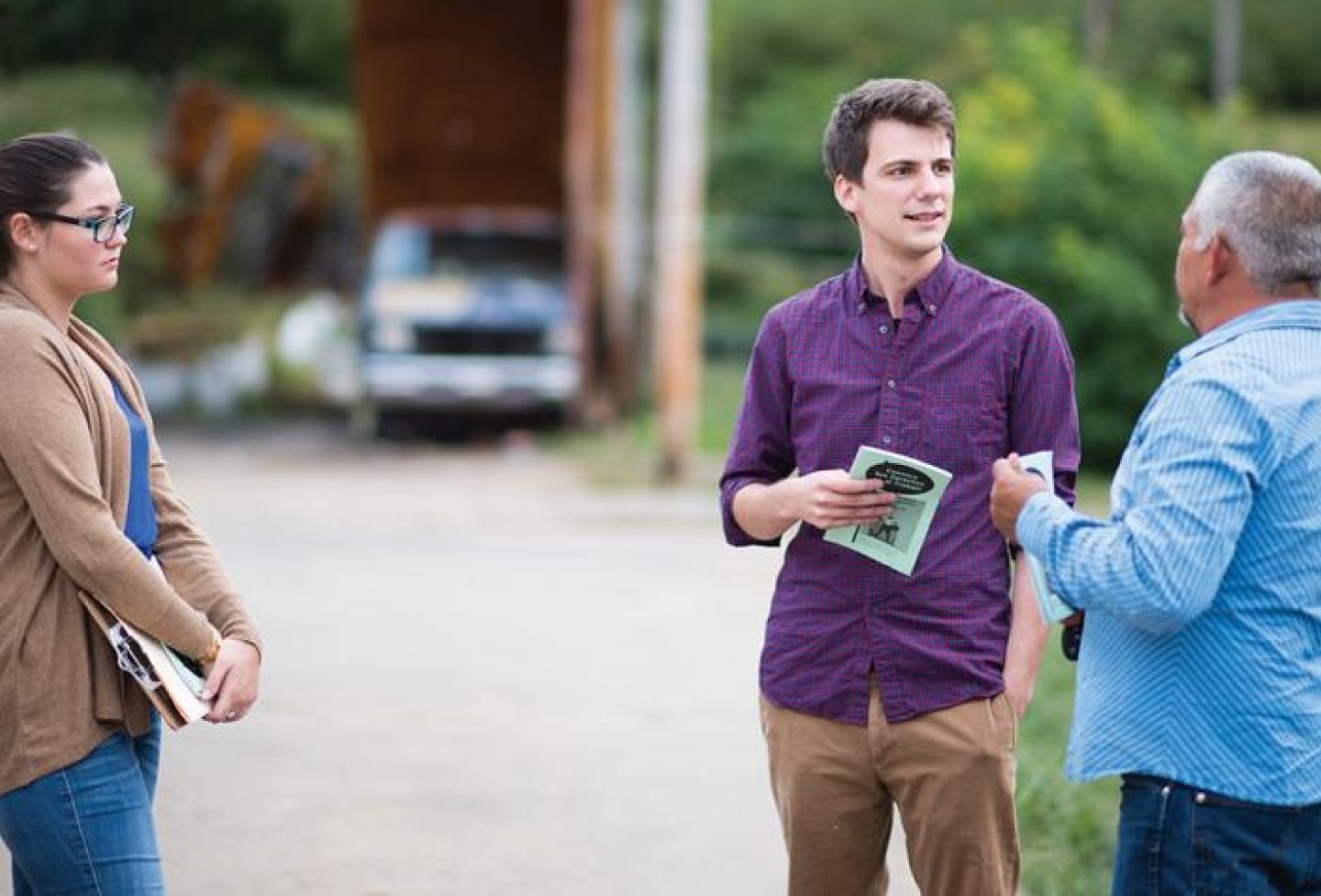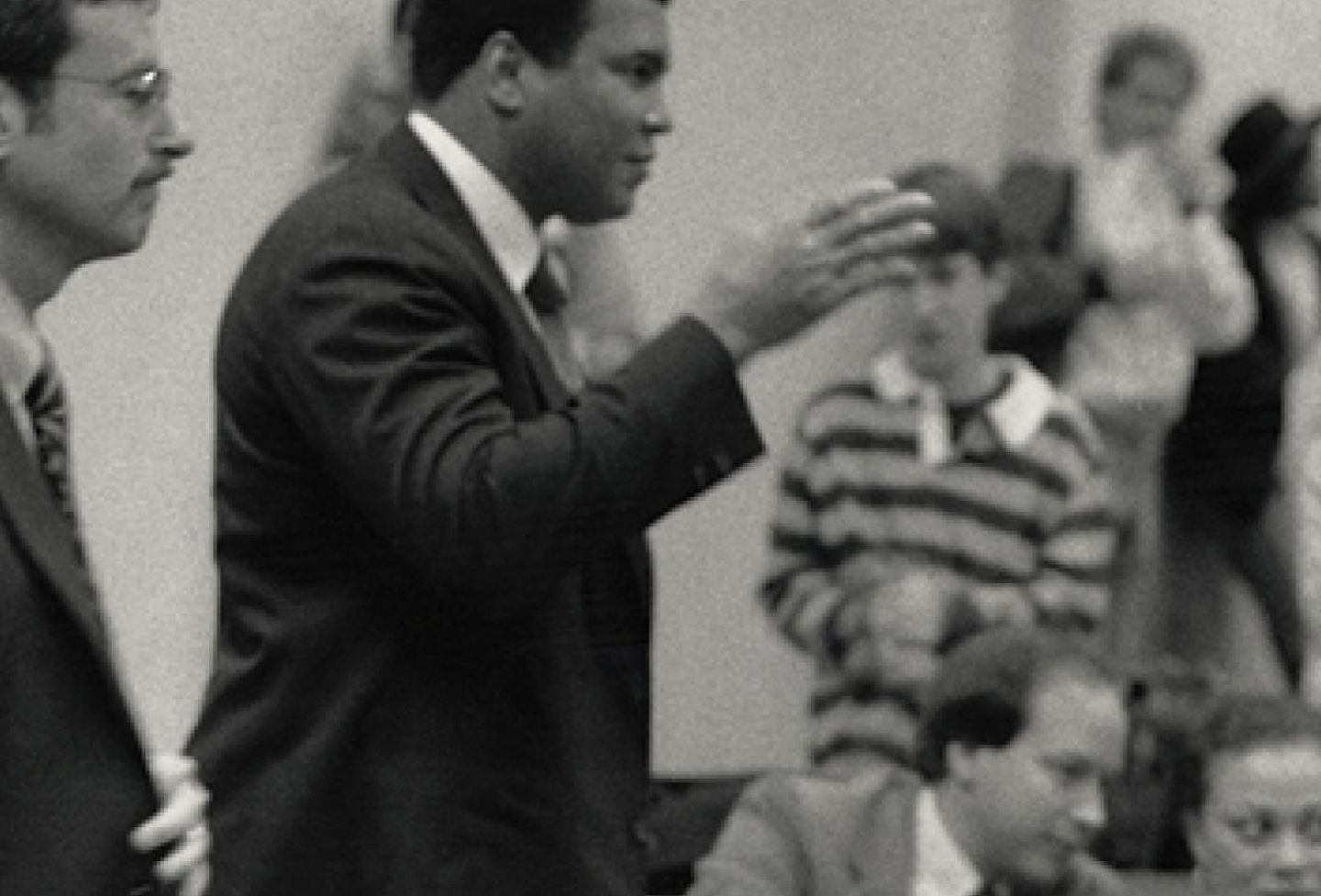In Memoriam: District of Maryland Judge Joseph H. Young ’51
Joseph H. Young ’51, who served as a district judge for the District of Maryland from 1971 until his retirement in 2002, died in March 2015. He was honored at the Judicial Conference of the Fourth Circuit on May 23, in a tribute submitted by his colleague Judge Richard D. Bennett with assistance from Bennett’s law clerk, Emily Hankin Petrila ’14.
The following excerpts (some edited for length) are from that tribute:
“Very few of us who appeared before him for many years were fully aware of his heroism in World War II. He enlisted at the age of 19 and quickly rose to the rank of reconnaissance sergeant in the famed 78th Lightning Infantry Division. It was this division that captured Ludendorff Bridge over the Rhine River at the famous Battle of Remagen in March of 1945. The capture of the bridge enabled General Eisenhower to rapidly deploy five divisions into Germany and shorten World War II in Europe. The Baltimore Sun has mentioned that Joe Young was one of the first American soldiers to cross the bridge. He received a Purple Heart and a Bronze Star for ‘his continuous reconnaissance reports from behind the lines after having been wounded.’
“After attending the Law School, Young joined the Baltimore law firm of Piper and Marbury, where he spent his entire career as a trial lawyer, rising to become managing partner.
“Already enjoying a reputation as an exceptional trial lawyer, Young exhibited the depth of his character in April of 1968. He volunteered to represent indigent defendants arrested during the riots in Baltimore after the assassination of Dr. Martin Luther King. Later that same year he was the co-chair of Maryland Lawyers for Nixon- Agnew. I suspect that few lawyers had this dual resume. In 1971 he was nominated by President Nixon and unanimously confirmed as a U.S. district judge for Maryland.
“Young was known for his collegiality, his sense of propriety and his great discipline. Jim Shea ’77, now the managing partner at Venable, served as Young’s law clerk. He advised the judge of his wedding plans during his clerkship. The wedding day ultimately had to be scheduled around Young’s court calendar and the honeymoon was somewhat abbreviated, as the judge needed Jim back in chambers.
“Young was decisive — and quick to note his ‘Rule 95’ to counsel. This meant they were free to drive down Route 95 to Richmond to appeal his ruling!
“Young handled many landmark cases during his 31 years on the bench. In 1973 he found a pattern of racial discrimination in Baltimore’s Fire Department and ordered that African-American firefighters be given promotions after years of bias against them. He received death threats afterwards and a U.S. marshal guarded his home. He also ruled in favor of African- Americans on Maryland’s Eastern Shore in a voting rights case challenging existing district lines and countywide voting. He presided over the political corruption trial of West Virginia Gov. Arch Moore in May of 1976, when Judge Kenneth K. Hall of the Southern District of West Virginia recused himself.
“He also presided over the political corruption trial of Baltimore County Executive Dale Anderson, who had succeeded Spiro Agnew as county executive. After Anderson was convicted for accepting bribes from contractors, Judge Young imposed a five-year prison sentence. The Baltimore Sun reported at the time that the sentence ‘sent shock waves through the corruption hierarchy in Maryland.’ These shock waves followed Agnew to the vice presidency and resulted in his resignation from office in October of 1973.
“There are several hundred letters that were written by Young to his mother that are now treasures of the Young family. These letters reflect the strength of his character and his compassion and kindness for his fellow man. In April of 1945, his unit liberated Buchenwald, the notorious Nazi concentration camp. Despite the horrors that he witnessed, he still noted in a letter that it is ‘hard to be cruel in dealing with civilians ... most of them are victims of the Nazis just as much as everyone else.’ It was this humanity and compassion for others that Young carried with him during his 31 years on the bench.”
—Rebecca Barns
In Memoriam: Renowned Iran Scholar Ruhi Ramazani S.J.D. ’54
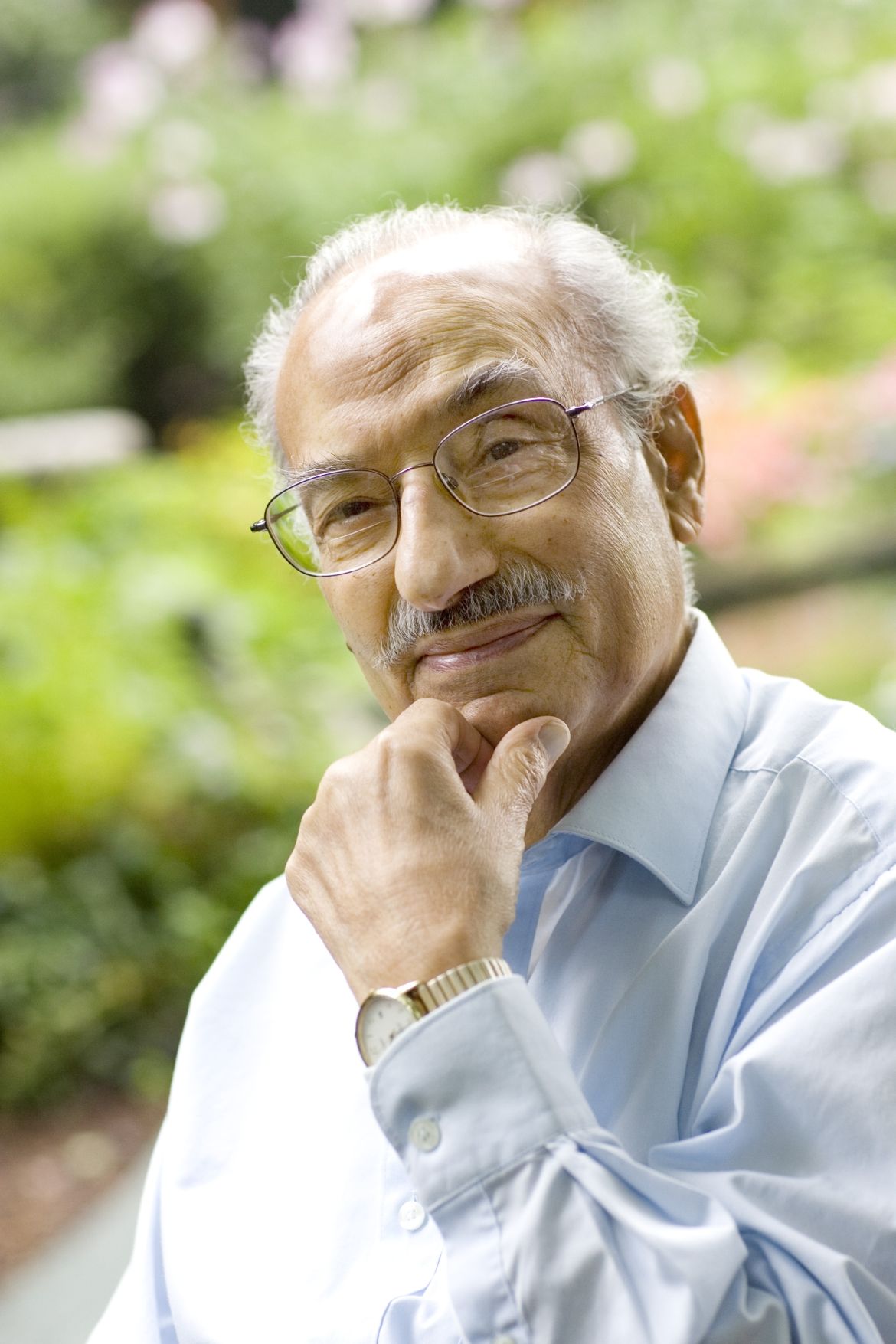
Rouhoullah “Ruhi” K. Ramazani S.J.D. ’54, a University of Virginia professor emeritus of government and foreign affairs who dedicated his life to UVA and to promoting political understanding of Iran-U.S. relations, died Oct. 5 in Charlottesville. He was 88.
Ramazani was the second person to earn a doctorate in the science of jurisprudence from UVA Law — and the first in international relations and international law.
Ramazani escaped a politically dangerous Iran in 1952, earned his doctorate, then joined the Woodrow Wilson Department of Government and Foreign Affairs (later the Woodrow Wilson Department of Politics), serving on the faculty and teaching for more than 40 years, until 1998.
He advised American presidents, including President Jimmy Carter during the Iranian Revolution and American hostage crisis in 1979, and continued to publish and lecture on international relations and the Middle East, especially Iran, until a few years ago. The media came to refer to Ramazani as the “dean of Iranian foreign policy studies in the United States.”
“Ruhi Ramazani was a brilliant, learned scholar, but more importantly, a warm and thoughtful human being, always ready to help colleagues, students or national leaders who sought his advice,” said Professor Emeritus David Martin, an international legal expert who served in the State Department’s fledgling human rights bureau under President Carter, among other government roles. “He was proud of his degree from the Law School, and he valued his ongoing connections here. His wise counsel, in so many arenas, will be missed by all who knew him.”
Born in Tehran in 1928, Ramazani was in law school there when political turmoil swept the country after World War II, and he feared for his life. He and his new wife, Nesta, made their way to the University of Georgia, where he prepared to advance his legal studies. His professors there recommended he transfer to UVA to pursue his studies in international law.
A year before he finished his doctorate, Ramazani taught the first course UVA offered on Middle Eastern politics. He was hired full-time after he finished his S.J.D.
Between his classes in international law and U.S. foreign policy, he taught some 8,000 students.
“Ruhi was the first — and for a long time, the only — person who taught anything about the Middle East in the politics department,” William B. Quandt, professor emeritus of politics, said. “But for years and years, he had a large number of students taking a series of courses on the region, at a time when most universities didn’t have anybody teaching this.”
The author of more than 100 articles and 10 books, Ramazani’s last volume was a collection of previously published articles and book chapters released in the fall of 2013. He published his last op-ed in January on the international and U.S. nuclear agreement with Iran, writing that it could lead to better relations.
The University recognized Ramazani’s many contributions with the creation of a chair in his name, his election to two endowed chairs, a Distinguished Professor Award and the Thomas Jefferson Award in 1994. His son, UVA English professor R. Jahan Ramazani, received the Thomas Jefferson Award in 2011. They are the first father and son to each have won the award.
—Anne E. Bromley and Eric Williamson
1960
Manfred W. Leckszas, who retired from his maritime law practice with Ober, Kaler in Baltimore, writes that he enjoys gardening, reading and time with his family—his wife, three children and six grandchildren— and that all are well and busy.
Daniel F. O’Keefe Jr. has moved to Goodwin House in Alexandria, Va., with his wife of 59 years, Sandra. He has two children, one of whom is Vicki E. O’Keefe ’84, and five grown grandchildren— “all employed!”
Rust E. Reid is listed in Texas Super Lawyers 2016 in estate planning and probate, and Best Lawyers 2017 in trusts and estates. He is of counsel with Thompson & Knight in Dallas, where he focuses his practice on estate planning, probate and fiduciary administration.
Alan H.W. Shiff has joined Reid and Riege as a member of the arbitration and mediation practice in Hartford, Conn. He is a retired U.S. bankruptcy judge for the District of Connecticut.
1962
Stephen Clarkson published a novel, “The Last Run,” this year. The book is set during Prohibition in the 1920s, and covers the subsequent legal rulings that had a devastating and dramatic effect on everyday people in small towns throughout the country.
 James A. Wade was honored this summer for reaching a 50-year milestone at Robinson + Cole in Hartford, Conn., where he is a litigation partner. For more than 20 years he served as outside counsel to the Connecticut Democratic Party and has represented three Connecticut governors in litigation. In recent years, he has tried complex criminal and civil cases involving antitrust, securities fraud, government contracting fraud, mail fraud and public corruption.
James A. Wade was honored this summer for reaching a 50-year milestone at Robinson + Cole in Hartford, Conn., where he is a litigation partner. For more than 20 years he served as outside counsel to the Connecticut Democratic Party and has represented three Connecticut governors in litigation. In recent years, he has tried complex criminal and civil cases involving antitrust, securities fraud, government contracting fraud, mail fraud and public corruption.
1963
William T. Wilson was honored with the Champion for Justice Award by the Virginia Chapter of the American Board of Trial Advocates. Wilson is a past president of the chapter and has been active in the Virginia Trial Lawyers Association and the Boyd Graves Conference. He served 16 years in the House of Delegates and was the founding chair of the Senior Lawyers Conference of the Virginia State Bar.
1964
John R. Normile Jr. writes that he is in his final year of practicing law, mainly trusts and estates. “My wife and I moved to a retirement community six years ago, and both my law firm and the retirement community have convinced me that retirement will be good.”
Lemuel Augustus “Gus” Smith is serving a two-year term as lieutenant governor for the First Mississippi Co. of the Jamestowne Society. First Mississippi Co. has 63 members who are descendants of those who owned land or had domiciles in Jamestown prior to 1700, or descendants of stockholders in the London Co. or the Virginia Co., or other colonial government officers. Members of the House of Burgesses, prior to 1700, are assumed to have had at least temporary domicile at Jamestown. Smith’s ancestor came to Virginia aboard the ship Sarah in 1611. The society’s national office is in Richmond, Va.
1965
Judge Tristram T. Hyde IV died on April 18. Before attending law school he was commissioned into the U.S. Marine Corps and served for 32 years— both on active and reserve duty. He retired as a full colonel in 1991. Hyde founded Hyde and Haynie in the 1970s in Fleeton, Va., and loved being a country lawyer, for which he occasionally was paid with crabs, oysters or farm produce. From 1983-2003 he served as judge for the General District Court of Northumberland, Lancaster, Essex, Richmond and Westmoreland counties. He served until last year as a substitute judge in Virginia.
Arland “Art” Stein has joined Kegler Brown Hill + Ritter in Columbus, Ohio, as director. He focuses his practice on intellectual property and patent litigation. He was previously with Hahn, Loeser & Parks.
1966
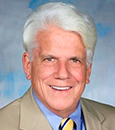 Guy O. Farmer II is listed in Chambers USA 2016 in labor and employment and Florida Super Lawyers 2016 in employment and labor, and employment litigation: defense. He is of counsel with GrayRobinson in Jacksonville.
Guy O. Farmer II is listed in Chambers USA 2016 in labor and employment and Florida Super Lawyers 2016 in employment and labor, and employment litigation: defense. He is of counsel with GrayRobinson in Jacksonville.
Gene Dahmen is listed in Best Lawyers 2017 in family law. She is senior counsel with Verrill Dana in Boston.
1968
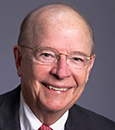 Harold “Hal” W. Mullis was awarded the President’s Fellow Medallion by the University of South Florida. The award honors his service to USF and the Tampa Bay business community. Mullis has served on the USF Board of Trustees, as board chair for Tampa General Hospital and Berkeley Preparatory School, and as a member of the board of governors for the Greater Tampa Chamber of Commerce. Last year he was inducted into the Tampa Bay Business Hall of Fame. Mullis is a founding member and president of Trenam Law, where he is a member of the corporate transactions practice group.
Harold “Hal” W. Mullis was awarded the President’s Fellow Medallion by the University of South Florida. The award honors his service to USF and the Tampa Bay business community. Mullis has served on the USF Board of Trustees, as board chair for Tampa General Hospital and Berkeley Preparatory School, and as a member of the board of governors for the Greater Tampa Chamber of Commerce. Last year he was inducted into the Tampa Bay Business Hall of Fame. Mullis is a founding member and president of Trenam Law, where he is a member of the corporate transactions practice group.
William Norman writes that 50 years after graduation he continues to try complex commercial cases before juries in California and frequently encounters UVA alumni. “I still remember my classes with Professor Scalia,” he notes.
1969
 Thomas G. Slater Jr. has been appointed to the State Council of Higher Education for Virginia. He is listed in Best Lawyers 2017 in antitrust law, bet-the- company litigation, commercial litigation, corporate law, personal injury litigation (defendants), and litigation in the antitrust, intellectual property and regulatory enforcement categories. He is also listed as a national litigation star in Benchmark Litigation 2016. He is special counsel with Hunton & Williams in Richmond, where he serves as chair emeritus for the litigation, labor and competition practices.
Thomas G. Slater Jr. has been appointed to the State Council of Higher Education for Virginia. He is listed in Best Lawyers 2017 in antitrust law, bet-the- company litigation, commercial litigation, corporate law, personal injury litigation (defendants), and litigation in the antitrust, intellectual property and regulatory enforcement categories. He is also listed as a national litigation star in Benchmark Litigation 2016. He is special counsel with Hunton & Williams in Richmond, where he serves as chair emeritus for the litigation, labor and competition practices.
